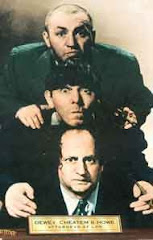Imagine this scenario. I am contacted by a representative from a large drug company that makes an expensive new drug. An offer is made. For every prescription for their drug I write, I will receive a monetary reward.
What would you think about me if I wrote that medicine for you? Would you wonder whether it was a decision based on what was really best for you, or it was a decision based on my own selfish interest? You would be right to wonder. I would wonder myself, were I in your position.
It would be possible, of course, that I really felt the medicine was the best one for the particular case at hand. But the appearance of impropriety would remain. That just makes sense for you to wonder.
Sadly, this is exactly the situation occurring every day, at almost every pharmacy in every town in this country. Pharmacists are paid bonuses for prescribing certain medications - generics.
The generic medication industry pays money to insurance companies and to PBMs (pharmaceutical benefit management) companies that provide medicine coverage for insurance companies. Those companies, in turn, pay cash bonuses to pharmacists who change prescriptions written by your doctor for a name brand medicine to a generic alternative. The percentage of name-brand medicines they arbitrarily "switch" to generics is recorded as the generic substitution rate (GSR). In some large pharmacies like Walgreen's and CVS, there is actually a quota that a pharmacist must reach each day in order to make their bonus.
This should give you a shudder. Are the pharmacists switching your doctor's orders out of loyalty to you? Or out of a desire to make more money personally? It is a legitimate question.
This is made more serious by the fact that generics, long touted as being "equivalent" to the name brand medications, are not at all equivalent. In keeping with the original Hatch-Waxman Act of 1984, the Congressional Act that gave birth to the modern generic industry by relaxing the rules leading to their availability to the market, a generic medication only has to be somewhere between 80% and 125% as effective as the name-brand medicine.
What does this mean for safety? Well, in some cases, it's not a huge deal. In other cases, however, it is a critical difference. For some medicines, the accuracy of the dose can have real life-and-death consequences for the unsuspecting patient. Take coumadin (Warfarin), a common anticoagulant medicine, for instance. If I prescribe 10mg of coumadin, it is because the patient needs 10mg. No more, no less. If the patient only receives 8mg (entirely possible under the Hatch-Waxman Act), the patient might develop life-threatening clots. If the patient receives 12.5mg, conversely, they might suffer over-anticoagulation and die from an internal bleed. Not exactly a minor difference, right? It doesn't get much more stark than life or death.
Now Senators Hatch and Waxman are at it again. They want to bring the most advanced new medicines - so called "biologics" - to market at a cheaper price. But because biologic agents are more difficult to copy, they have done away with the inconvenient "bioequivalent" language in the original act. They are only requiring these new generics to be "biosimilar" to the original.
I don't know about you, but I would just as soon not be given a medicine that "may be kind of like" the medicine my doctor prescribed. Maybe it's just me.
So the next time you hear someone griping about the high cost of prescriptions and rallying for cheaper generics to be made available, remember this post. Sometimes you really do get what you pay for.










